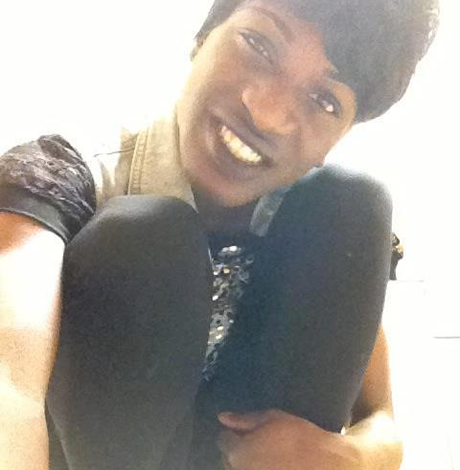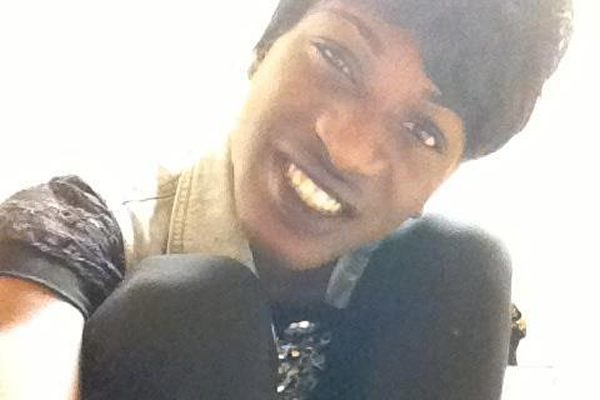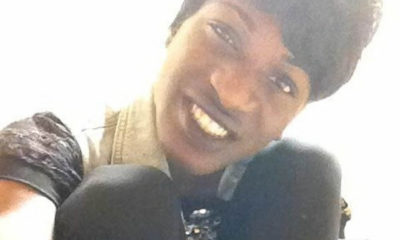Local
Jury deadlocked in trans murder case
Judge sends jurors back for further deliberations


A D.C. Superior Court jury on Wednesday announced it was unable to reach a unanimous verdict on whether two men were guilty or innocent of first-degree murder for the July 4, 2016 shooting death of transgender woman Deeniquia “Dee Dee” Dodds on a Northeast D.C. street.
But the jury disclosed through its foreperson that it found defendant Monte Johnson, 23, not guilty on seven of 15 other charges filed against him and found defendant Jolonta Little, 28, not guilty on five of the same 15 additional charges against him, including the charge of possession of a firearm during a crime of violence.
The jury reached just one guilty verdict, said the foreperson. Little was found guilty of a single count of carrying a pistol without a license outside of a home or business.
Judge Milton C. Lee then instructed the jury to return to the jury room to continue their deliberations and to make an earnest effort to reach verdicts on the remaining charges for which they were deadlocked.
The partial verdicts by the jury came at the conclusion of a month-long trial in which prosecutors with the U.S. Attorney’s Office argued that Little, Johnson and two other men targeted as many as seven transgender women for armed robberies along streets where female trans sex workers congregate on the night Dodds was shot.
The prosecutors, Assistant U.S. Attorneys Thomas Saunders and Ahmed Baset, told the jury Dodds was among the trans women targeted by the men in the early morning hours of July 4, 2016. The prosecutors said defendant Johnson fatally shot Dodds in the neck after she fought back when Johnson and another man implicated in the murder attempted to rob her at gunpoint.
The other man that allegedly targeted Dodds, Cyheme Hall, 23, and his brother, Shareem Hall, 25, had been charged along with Little and Johnson with first-degree murder while armed in connection with the Dodds murder. But prosecutors informed the jury at the start of the trial that the Hall brothers agreed to become cooperating witnesses for the government after pleading guilty to second-degree murder in the Dodds case.
In dramatic testimony at the trial, Cyheme Hall told the jury it was Johnson who shot Dodds in the neck at point blank range after she grabbed the barrel of his handgun as Johnson and Hall attempted to rob her on Division Ave., N.E. near where she lived. Hall testified that the plan among the men to commit robberies did not include the intent to kill anyone.
Although prosecutors presented numerous other witnesses who they said corroborated testimony by the Hall brothers, defense attorney Kevin Irving, who represents Johnson, and Brandi Harden, who represents Little, told the jury the Hall brothers were habitual liars with no credibility and anything they said in their testimony should be discounted.
The two defense attorneys pointed to what they said were inconsistencies in the Hall brothers’ testimony and noted that the Halls’ motives were aimed strictly at telling prosecutors what the prosecutors wanted to hear so they could get off with a lighter sentence.
The defense attorneys also argued repeatedly that jurors were required by law to find the defendants not guilty if they had a reasonable doubt about Johnson and Little’s guilt in any aspect of the complex circumstances surrounding the murder.
Prosecutor Saunders reminded the jury in his rebuttal argument last week that “solid” corroborating evidence linking Johnson and Little to the murder and a string of armed robberies of other trans women that took place on the night of the murder.
Among the key corroborating evidence, Saunders pointed out, was a GPS ankle bracelet that Little wore on the night of the murder stemming from a previous conviction and probation he received in an unrelated criminal case. The tracking of Little’s whereabouts that night by GPS experts placed him at the scene of three robberies Little and Johnson were charged with committing, including the scene where Dodds was shot, at the exact time those incidents occurred.
Saunders noted that prosecutors and police also tracked the cell phone conversations between Little and Johnson and the Hall brothers that they say placed them at the scene of the robberies and shooting.
In addition, Saunders pointed to recorded phone conversations played before the jury that the government obtained of Johnson talking with his girlfriend by phone while in jail awaiting trial for the Dodds murder in which prosecutors say he admitted committing the murder.
During Wednesday morning’s court session, the jury announced it found Little not guilty on seven separate counts of possession of a firearm during a crime of violence. The jury found him guilty of a single count of carrying a pistol without a license outside of a home or business.
The jury similarly found Johnson not guilty on five counts of possession of a firearm during a crime of violence. It did not find Johnson guilty of any charges as of Wednesday morning.
Among the charges against both men for which the jury reported it was deadlocked included felony murder while armed, conspiracy, assault with a dangerous weapon, robbery while armed, and additional counts of possession of a firearm during a crime of violence.
If the jury remains deadlocked on the charges it announced Wednesday morning it would be up to Judge Lee to decide whether to approve a possible request by prosecutors for a new trial or an expected motion by defense attorneys to dismiss the case.
District of Columbia
Bowser budget proposal calls for $5.25 million for 2025 World Pride
AIDS office among agencies facing cuts due to revenue shortfall

D.C. Mayor Muriel Bowser’s proposed fiscal year 2025 budget includes a request for $5.25 million in funding to support the June 2025 World Pride celebration, which D.C. will host, and which is expected to bring three million or more visitors to the city.
The mayor’s proposed budget, which she presented to the D.C. Council for approval earlier this month, also calls for a 7.6 percent increase in funding for the Mayor’s Office of LGBTQ Affairs, which amounts to an increase of $132,000 and would bring the office’s total funding to $1.7 million. The office, among other things, provides grants to local organizations that provide services to the LGBTQ community.
Among the other LGBTQ-related funding requests in the mayor’s proposed budget is a call to continue the annual funding of $600,000 to provide workforce development services for transgender and gender non-conforming city residents “experiencing homelessness and housing instability.” The budget proposal also calls for a separate allocation of $600,000 in new funding to support a new Advanced Technical Center at the Whitman-Walker Health’s Max Robinson Center in Ward 8.
Among the city agencies facing funding cuts under the mayor’s proposed budget is the HIV/AIDS, Hepatitis, Sexually Transmitted Disease, and Tuberculosis Administration, known as HAHSTA, which is an arm of the D.C. Department of Health. LGBTQ and AIDS activists have said HAHSTA plays an important role in the city’s HIV prevention and support services. Observers familiar with the agency have said it recently lost federal funding, which the city would have to decide whether to replace.
“We weren’t able to cover the loss of federal funds for HAHSTA with local funds,” Japer Bowles, director of the Mayor’s Office of LGBTQ Affairs, told the Washington Blade. “But we are working with partners to identify resources to fill those funding gaps,” Bowles said.
The total proposed budget of $21 billion that Bowser submitted to the D.C. Council includes about $500 million in proposed cuts in various city programs that the mayor said was needed to offset a projected $700 million loss in revenue due, among other things, to an end in pandemic era federal funding and commercial office vacancies also brought about by the post pandemic commercial property and office changes.
Bowser’s budget proposal also includes some tax increases limited to sales and business-related taxes, including an additional fee on hotel bookings to offset the expected revenue losses. The mayor said she chose not to propose an increase in income tax or property taxes.
Earlier this year, the D.C. LGBTQ+ Budget Coalition, which consists of several local LGBTQ advocacy organizations, submitted its own fiscal year 2025 budget proposal to both Bowser and the D.C. Council. In a 14-page letter the coalition outlined in detail a wide range of funding proposals, including housing support for LGBTQ youth and LGBTQ seniors; support for LGBTQ youth homeless services; workforce and employment services for transgender and gender non-conforming residents; and harm reduction centers to address the rise in drug overdose deaths.
Another one of the coalition’s proposals is $1.5 million in city funding for the completion of the D.C. Center for the LGBTQ Community’s new building, a former warehouse building in the city’s Shaw neighborhood that is undergoing a build out and renovation to accommodate the LGBTQ Center’s plans to move in later this year. The coalition’s budget proposal also calls for an additional $300,000 in “recurring” city funding for the LGBTQ Center in subsequent years “to support ongoing operational costs and programmatic initiatives.”
Bowles noted that Bowser authorized and approved a $1 million grant for the LGBTQ Center’s new building last year but was unable to provide additional funding requested by the budget coalition for the LGBTQ Center for fiscal year 2025.
“We’re still in this with them,” Bowles said. “We’re still looking and working with them to identify funding.”
The total amount of funding that the LGBTQ+ Budget Coalition listed in its letter to the mayor and Council associated with its requests for specific LGBTQ programs comes to $43.1 million.
Heidi Ellis, who serves as coordinator of the coalition, said the coalition succeeded in getting some of its proposals included in the mayor’s budget but couldn’t immediately provide specific amounts.
“There are a couple of areas I would argue we had wins,” Ellis told the Blade. “We were able to maintain funding across different housing services, specifically around youth services that affect folks like SMYAL and Wanda Alston.” She was referring to the LGBTQ youth services group SMYAL and the LGBTQ organization Wanda Alston Foundation, which provides housing for homeless LGBTQ youth.
“We were also able to secure funding for the transgender, gender non-conforming workforce program,” she said. “We also had funding for migrant services that we’ve been advocating for and some wins on language access,” said Ellis, referring to programs assisting LGBTQ people and others who are immigrants and aren’t fluent in speaking English.
Ellis said that although the coalition’s letter sent to the mayor and Council had funding proposals that totaled $43.1 million, she said the coalition used those numbers as examples for programs and policies that it believes would be highly beneficial to those in the LGBTQ community in need.
“I would say to distill it down to just we ask for $43 million or whatever, that’s not an accurate picture of what we’re asking for,” she said. “We’re asking for major investments around a few areas – housing, healthcare, language access. And for capital investments to make sure the D.C. Center can open,” she said. “It’s not like a narrative about the dollar amounts. It’s more like where we’re trying to go.”
The Blade couldn’t’ immediately determine how much of the coalition’s funding proposals are included in the Bowser budget. The mayor’s press secretary, Daniel Gleick, told the Blade in an email that those funding levels may not have been determined by city agencies.
“As for specific funding levels for programs that may impact the LGBTQ community, such as individual health programs through the Department of Health, it is too soon in the budget process to determine potential adjustments on individual programs run though city agencies,” Gleick said.
But Bowles said several of the programs funded in the mayor’s budget proposal that are not LGBTQ specific will be supportive of LGBTQ programs. Among them, he said, is the budget’s proposal for an increase of $350,000 in funding for senior villages operated by local nonprofit organizations that help support seniors. Asked if that type of program could help LGBTQ seniors, Bowles said, “Absolutely – that’s definitely a vehicle for LGBTQ senior services.”
He said among the programs the increased funding for the mayor’s LGBTQ Affairs office will support is its ongoing cultural competency training for D.C. government employees. He said he and other office staff members conduct the trainings about LGBTQ-related issues at city departments and agencies.
Bowser herself suggested during an April 19 press conference that local businesses, including LGBTQ businesses and organizations, could benefit from a newly launched city “Pop-Up Permit Program” that greatly shortens the time it takes to open a business in vacant storefront buildings in the downtown area.
Bowser and Nina Albert, D.C. Deputy Mayor for Planning and Economic Development, suggested the new expedited city program for approving permits to open shops and small businesses in vacant storefront spaces could come into play next year when D.C. hosts World Pride, one of the word’s largest LGBTQ events.
“While we know that all special events are important, there is an especially big one coming to Washington, D.C. next year,” Bowser said at the press conference. “And to that point, we proposed a $5.25 million investment to support World Pride 2025,” she said, adding, “It’s going to be pretty great. And so, we’re already thinking about how we can include D.C. entrepreneurs, how we’re going to include artists, how we’re going to celebrate across all eight wards of our city as well,” she said.
Among those attending the press conference were officials of D.C.’s Capital Pride Alliance, which will play a lead role in organizing World Pride 2025 events.
Maryland
Health care for Marylanders with HIV is facing huge cuts this summer
Providers poised to lose three-quarters of funding

BY MEREDITH COHN | By the end of June, health care providers in Maryland will lose nearly three-quarters of the funding they use to find and treat thousands of people with HIV.
Advocates and providers say they had been warned there would be less money by the Maryland Department of Health, but were stunned at the size of the drop — from about $17.9 million this fiscal year to $5.3 million the next. The deep cuts are less than three months away.
The rest of this article can be read on the Baltimore Banner’s website.
District of Columbia
Taste of Point returns at critical time for queer students
BIPOC scholar to speak at Room & Board event on May 2

The Point Foundation will kick off May with its annual Taste of Point DC event. The event will be hosted at Room & Board on 14th Street and feature a silent auction, food tastings, a speech from a scholar, and more.
Point’s chief of staff, Kevin Wright, said that at Taste of Point, the scholars are the star of the show.
“People never come to an event to hear Point staff speak, they come to hear from the people most impacted by the program,” he said. “At its core Taste of Point is designed to center and highlight our scholars’ voices and experiences.”
This year, a Point BIPOC Scholar, Katherine Guerrero Rivera will speak at the event.
“It is a great opportunity to highlight the scholars out there on the front lines making impacts in almost every sector and job field,” Wright said.
Wright pointed out that this year especially is a pivotal time for LGBTQ students.
“In 2023, there were 20 states that passed anti-LGBTQ legislation,” he said. “By this point in [2024] we already have more.”
Wright said the impacts of those legislative attacks are far reaching and that Point is continuously monitoring the impact they have on students on the ground.
Last month, The Washington Post reported that states with anti-LGBTQ laws in place saw school hate crimes quadruple. This report came a month after a non-binary student, Nex Bennedict, died after being attacked at school.
“So, we see this as a critical moment to really step up and help students who are facing these challenges on their campus,” Wright said. “Our mission is to continue to empower our scholars to achieve their full academic and leadership potential.”
This year Point awarded nearly 600 LGBTQ students with scholarships. These include the flagship scholarship, community college scholarship and the BIPOC scholarship. When the foundation started in 2002, there were only eight scholarships awarded.
Dr. Harjant Gill is one of those scholars who said the scholarship was pivotal for him. Gill said he spent his undergraduate years creating films and doing activism for the LGBTQ community.
As a result, his academic record wasn’t stellar and although he was admitted into American University’s graduate program he had no clue how he would fund it.
Upon arrival to American he was told to apply for a Point scholarship and the rest was history.
“It ended up being the one thing that kept me going otherwise I would have dropped out,” he said. “Point was incredibly instrumental in my journey to becoming an academic and a professor.”
More than a decade later, Gill serves on the host committee for Taste of Point and is a mentor to young Point scholars. He said that he donates money yearly to Point and that when he is asked what he wants for a gift he will often tell his friends to donate too.
To attend the event on Wednesday, May 2, purchase tickets at the Point website. If you can’t attend this year’s Taste of Point DC event but would like to get involved, you can also donate online.

















